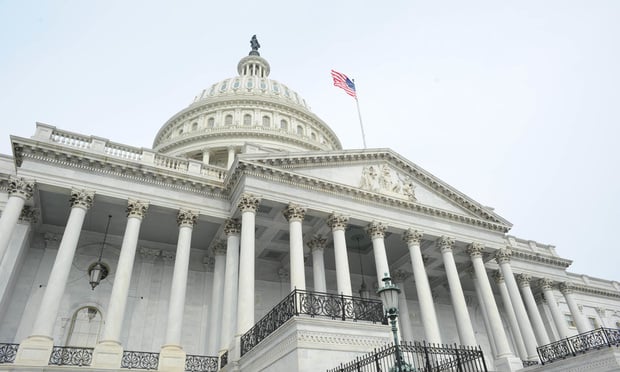 The U.S. Capitol
The U.S. Capitol
With only 24 working days left on the 2024 congressional calendar, lawmakers are back in Washington, D.C. this week to take up a number of issues including a government funding deadline that arrives on Dec. 20.
As a possible government shutdown looms, leaders from America’s Credit Unions sent lawmakers a list of seven issues on Tuesday that addresses legislative “credit union priorities and bills of concern” they hope can be addressed during these final days of the Biden Administration and potentially bleeding into the early days of President-Elect Donald Trump’s second term.
According to the letter sent to House and Senate leaders, America’s Credit Unions President/CEO Jim Nussle laid out the following stances on seven legislative areas the credit union group supports and opposes:
Oppose Efforts to Expand Interchange Price Caps
“This legislation would harm community financial institutions, including credit unions, by extending debit interchange routing requirements to also cover credit cards,” Nussle wrote. “That change would function as a backdoor price control on credit card transactions and would affect financial institutions of all sizes, regardless of the proposed exemption, and could greatly increase fraud costs as merchants select cheaper but less secure networks to process transactions.”
Oppose the Protecting Consumers From Payment Scams Act
“This legislation would amend the Electronic Fund Transfer Act (EFTA) to define an unauthorized transfer as one that includes a fraudulently induced transfer, requiring credit unions and other financial institutions to reimburse consumers for this type of fraud. The EFTA was designed to strike a balance between a financial institution’s role in preventing unauthorized transfers and the individual’s responsibility to exercise sound financial judgment over what they choose to authorize. The Protecting Consumers From Payment Scams Act would destroy that balance,” Nussle wrote.
Oppose Efforts to Expand NCUA Vendor Authority
“America’s Credit Unions strongly opposes any efforts to expand the National Credit Union Administration’s (NCUA) examination authority over credit union third-party vendors. America’s Credit Unions and our member credit unions believe that cybersecurity, including the security of vendors that credit unions do business with, is an important issue. However, we are opposed to granting new and broad powers to the NCUA to examine third parties at this time. America’s Credit Unions believes in a strong NCUA, but we also believe that the NCUA should stay focused on where its expertise lies — regulating credit unions,” Nussle wrote.
Urge the Senate to Act on the Bipartisan Credit Union Board Modernization Act
“America’s Credit Unions strongly supports the Credit Union Board Modernization Act, H.R. 582 and S. 610, which would reduce the outdated requirement that credit union boards of directors hold monthly meetings to instead require no fewer than six meetings per year. The new standard would only apply to credit unions in strong financial condition, protecting the safety and soundness of the financial system, and would allow those credit unions to devote more resources toward serving their members,” Nussle wrote.
Support Greater Transparency From the CDFI Fund
“Credit unions have lost CDFI certification without warning or a cure period to rectify issues, applications for CDFI certification have faced significant delays, and the CDFI Fund has not engaged in clear communication about changes to certification criteria. CDFIs provide vital support to underserved communities, and we encourage Congress to examine these issues and press the CDFI Fund to address these concerns and work more closely with functional regulators, including the NCUA, to reduce burdens on CDFI-certified institutions,” Nussle wrote.
Support Passage of the SAFE Banking Act
“America’s Credit Unions has heard from a number of our member credit unions in these states that they are being approached by their members, or potential members, who have a small business in or are serving the legal cannabis industry in their state and are seeking banking services. As the cultivation, sale, distribution, and possession of marijuana remains illegal at the federal level under Schedule I of the Controlled Substances Act, the majority of credit unions remain hesitant to provide financial services to these members and their small businesses in light of significant regulatory challenges that compound the uncertainty of providing financial services to state-authorized marijuana-related businesses,” Nussle wrote.
Promoting the Value of the Credit Union Tax Exemption
“Finally, as you look ahead to the 2025 legislation session, we wanted to make clear the difference credit unions make in the lives of over 140 million Americans because of the credit union tax-exempt status. Credit unions are mutually-owned financial cooperatives. Because credit unions are not focused on paying profits to investors, they are committed to making financial services more affordable for their members. A credit union returns its earnings to its members in the form of reduced fees, lower interest rates on loans, higher savings rates, and institutional improvements,” Nussle wrote.
READ MORE: Letter to Lawmakers from America's Credit Unions
© Touchpoint Markets, All Rights Reserved. Request academic re-use from www.copyright.com. All other uses, submit a request to [email protected]. For more inforrmation visit Asset & Logo Licensing.







